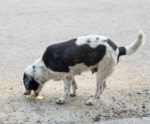 Vomiting causes and types in animals could be caused by a number of different things from mild food poisoning to serious life-threatening illnesses like Pancreatitis. The problem can be deciding if the vomiting is something serious that you need a vet for, or something that you can deal with yourself.
Vomiting causes and types in animals could be caused by a number of different things from mild food poisoning to serious life-threatening illnesses like Pancreatitis. The problem can be deciding if the vomiting is something serious that you need a vet for, or something that you can deal with yourself.
Vomiting can be caused by a number of things including:
- Infections
- Diet changes
- Out of date or spoiled food
- Parasites like worms
- Pancreatitis
- Excessive exercise or excitement
- Twisted, swollen or flipped stomach especially in deep-chested dogs
- Food allergies or intolerances
- Eating non-digestible foods like toys
- Kidney problems
- Liver problems
- Gastritis
- Simply eating too fast.
You will need to look at other signs and their behaviour to give you a clue on the diagnosis and to give your vet more of an idea to diagnose the problem.
One serious sign is where they have a temperature as well as vomiting. Check their temperature with a thermometer or if you do not have one, feel their nose to see if it is hot and dry. The average temperature of a dog 38.5 degree Celsius and with a normal range of 38 to 39.1-degree Celsius. You can also check the stomach area for heat, swelling and discomfort. If you think they have a temperature as well get them to the vet as soon as possible.
The next check is not so pleasant as you will need to closely look at the vomit.
If the vomit is a yellow colour, this can just be the bile in the stomach and may indicate that they have eaten something that does not agree with them.
Mucus in the vomit could indicate inflammation or ulceration and this is not a good sign and will need the help of a vet.
Blood in the vomit or dark patches could indicate damage to the stomach and it is another indication that you need to take them to the vet.
A good thing to do is to take photos of the vomit with your phone and collect a sample so that the vet can see and test the vomit.
The next thing the vet will need to know is how are they vomiting and what do they behave like. Have they lost their appetite, are their gums pale, are they crying or whimpering, have they been out of character or aggressive. The timing of the vomiting is also a good sign for the vet, was it before or after food, on a walk or exercise and how long did it go on for.
The vet may have to try different things to work out what the problem is and sometimes the vomiting simply goes away and you never know the cause.
One thing that is often advised is to restrict or change their food to bland simple foods like cooked chicken and rice or they may advise restricting all food for a length of time but still allow water.
It may be that the vet will prescribe tablets like antibiotics, where there is a bacterial infection and anti-nausea drugs may also be injected or given in table form. They are usually injected as then they will not vomit them up again.
Dehydration is a big problem with vomiting as they vomit any water taken in. A vet may keep them in and put them on an intravenous drip for a short while to add fluids and prevent dehydration.
If the problem was an allergy, a diet change may be needed and your vet or food supplier can advise what is best.
Persistent vomiting can lead to aspiration pneumonia where vomit has been inhaled into the lungs causing dangerous problems or metabolic acidosis.


Pingback: Lungworm can affect dogs and this is one of the things we protect
Pingback: Ibuprofen and pets do not mix. Ibuprofen is a painkiller that is available
Pingback: Vomiting and your pets and what you need to be aware of
Pingback: Dehydration in pets, dogs and cats and first aid treatment